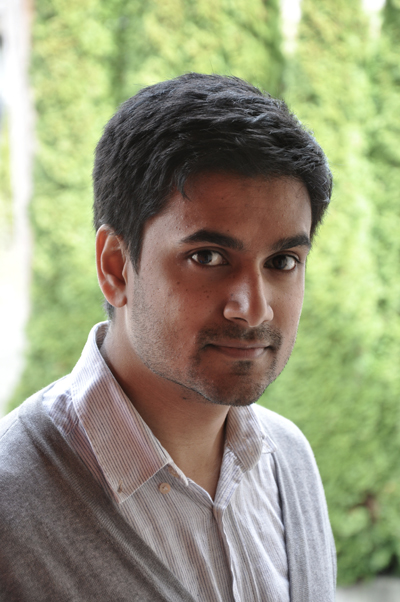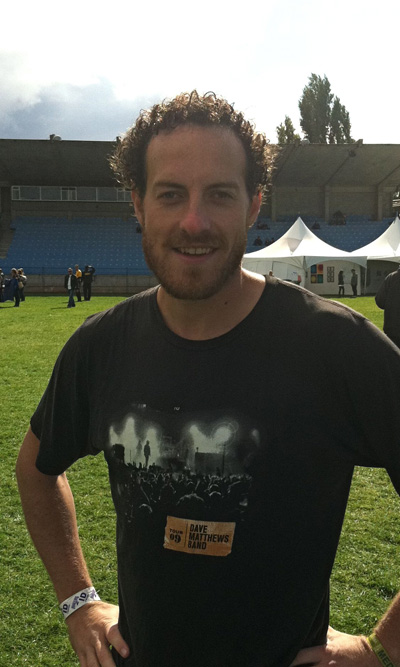Interviews
Fast Scrawling Interspersed with Slow Thinking: Tyler Laing in Conversation with Naben Ruthnum
 Malahat fiction board intern, Tyler Laing, speaks with the winner of our 2012 Novella Prize, Naben Ruthnum, about his winning entry, "Cinema Rex."
Malahat fiction board intern, Tyler Laing, speaks with the winner of our 2012 Novella Prize, Naben Ruthnum, about his winning entry, "Cinema Rex."First of all, congratulations on your novella victory! What was your first thought when you found out you had won?
Probably a thought with lots of happy profanity in it. I was pleased, certainly; I’d had a string of rejected stories in the past few months, so it was a nice turnaround.
Do you often enter literary contests? If so, what are some of the others you have entered or plan to target?
I’ve entered a few, mostly ones linked to Canadian literary journals. I took McGill University’s Peterson Prize a couple of years ago, but other than that, the Malahat win is my first. I don’t necessarily target contests—if I finish a story and feel that would be a good fit for a contest that’s on at that moment, I’ll send it in.
What are your literary goals? How much value do you put in writing contests? Have you pursued other means of having your work published?
Richard Ford just wrote a piece for the Globe and Mail in which he said that good novels add “to the sum of available reality.” That fits what I try to do, even in my more pulp-oriented work. “Cinema Rex” tries to replicate the way in which we remember events and characters from our past through subsequent meetings and events which “taint” each recollection. That was my aim with this particular story, but aims shift for different projects.
Literary contests are important for a few reasons, especially for writers like me, who are at the outset of their careers. (Hopefully that career is manifesting. I’ll tell you later.) Visibility, money which provides time to write, and some form of recognition from peers and publishers can result from a contest win, and these are all much appreciated.
I’ve sent in work to magazines, both online and print, but the only other publishing I’ve engaged in so far is the journal at my website.
The novella can be a tricky form, but, if “Cinema Rex” is any indication, you know what you’re doing when it comes to writing this length. Which do you prefer, the novella or the short story? What are the merits and challenges of each form?
Rex is the only novella I’ve ever written, so I can’t offer much in the way of experienced insight. The story dictates its length—I don’t mean the characters reach out and command me to extend the word count, just that a story of a certain shape or complexity will sometimes need to run a little longer than a short and a little shorter than a novel.
Speaking of characters, the dynamic of the kids in “Cinema Rex” feels so right—the way they interact, handle situations, and move through the story. How much did you draw from your own childhood when carving out certain situations and creating these characters?
The interaction between the boys could have something to do with the way my friends and I talked to each other long ago, but I did grow up in Kelowna, in vastly different circumstances from the story’s characters. My father and mother both grew up on Mauritius in the early fifties, and have told me stories about the place for decades. My dad, in particular, grew up near a movie theatre, and developed an attachment to film that he passed on to me when I was younger. A few stories I’ve heard from family over the years went through the distortions and clarifications of fiction to end up in “Cinema Rex.”
The footnotes are an effective way of showing us some of the characters' future lives, which adds importance to specific moments and encounters in the present that might otherwise have seemed insignificant. Where did the idea to include these footnotes come from?
From a few different ideas colliding. The first footnote I added, which is about The Road Warrior, was put in as a funny aside that I half-thought I’d be deleting later. I then considered having a footnote for each of the characters, consisting of a significant/amusing incident involving them watching a film in the storyline’s future, but I decided that would be purely distracting and indulgent, without adding much. Using the footnotes to create a future-story for the characters that would run concurrently with the present-story probably came from heavy doses of time-travel sci-fi in my teenage years and beyond.
Can you tell me a little about the thriller you recently completed? Is this your first foray into the novel? What are your thoughts on writing the novel and do you intend to pursue it more?
The thriller, titled “Scrapbook,” is a psychological novel set in Seattle. I’m revising the last section just now, so to call it completed is jumping the gun a little. I’d like to move on to a different sort of novel after this, and have actually been thinking about revisiting some of the situations in “Cinema Rex” at greater length.
There's a great economy of language at work in “Cinema Rex” and it feels like you fit a lot into your 10,000 words. How long did it take you to write this novella? How much tinkering did you have to do to get it right?
I wrote about fourteen pages in a couple of sittings, then left the story behind for a couple of months, as I wasn’t sure where to take the idea. It was turning into a sort of typical coming-of-age story that I had no interest in reading or writing, and it wasn’t until I had the idea of drawing Renga toward film music in the same way that Vik would be drawn to criticism that I thought of a way to make the story work. The footnote idea enhanced that, and I was able to finish the rest of the writing in another couple of sittings. So, fast scrawling interspersed with slow thinking. I think that it took about four months from concept to final draft, during which time I was working on other projects. I sent it to the same trusted friends that read all of my work, and they responded well. It seemed to ring true for my sister and parents, as well, which was reassuring. I’ve been to Mauritius before, but I’ve never been there in the 1950s—I was glad my combination of inventing facts and asking annoying questions of informed people led to a setting that is believable.
Who are some authors that inspire you? What are a few of your favourite titles? What are you currently reading?
That is a triple-barreled question that calls for many lists. Kingsley Amis, Robert Aickman, Richard Stark, Iris Murdoch, and Saul Bellow are the first five big names that come to mind in terms of writers that I have spent a lot of time with. As for favourite titles, I’ll pick Joyce Cary’s The Horse’s Mouth and Patricia Highsmith’s Collected Short Stories.
My online journal, despite the lack of frequent updates, reflects what I’m reading at the moment. Charles Willeford’s work took up a lot of May, balanced with some David Mitchell and the huge “Alec” omnibus by Eddie Campbell.
What are some of the things you like to do in your spare time when you’re not writing?
Stare at the guitar I used to play, argue with friends, worry, read.
What’s this comic that you’re working on all about? Have you dabbled in the comic or graphic novel before? What’s the draw?
The concept of the comic is fairly simple: in a riff on the large influx of autobiographical comics (many of which are excellent, including the work of Chester Brown and Seth), Hall Patch is a comic where I create fictional scenarios for a persona vaguely based on the artist drawing the book, Mark Hall-Patch. The situations are often cruel and hopefully funny.
This will be my first comic, primarily because I can’t draw worth a damn. When I was ten I drew a flawless napkin sketch of Hagar the Horrible’s wife, but it was a brush with perfection that I’ve never repeated. Mark is talented and wanted to collaborate, so we’re both doing this as a side project. For the moment, other things we are doing have relegated the comic to slow development, but there will be sample pages posted soon.
Once the comic is out of the way, what will your next project be?
My focus is on making sure this crime novel is completed to my satisfaction, but there’s also a film project I’m working on with a few Vancouver-based collaborators. That’s an entirely different world, but it’s interesting and gratifying to be working with a group of people who have a clear idea of what they want to do and what my place in the project is.
Naben Ruthnum can be found at www.nabenruthnum.com

Tyler Laing
* * * * * * * *
Check out the guidelines for our 2014 Novella Prize.









